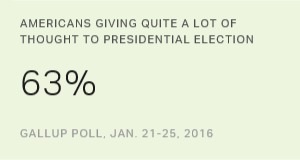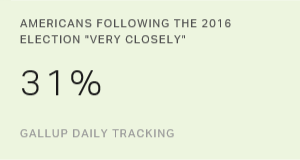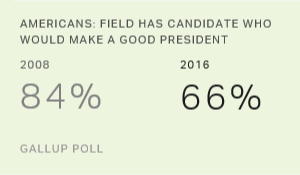Story Highlights
- All rate the economy, terrorism, jobs and healthcare as important
- Republicans put more priority on fixing government and the deficit
- Democrats rate climate change, inequality as more important
PRINCETON, N.J. -- Republicans and Democrats agree on the importance of the presidential candidates' positions on the economy, terrorism, jobs and healthcare. Beyond these, however, the two partisan groups differ significantly on the importance they assign to other campaign issues.
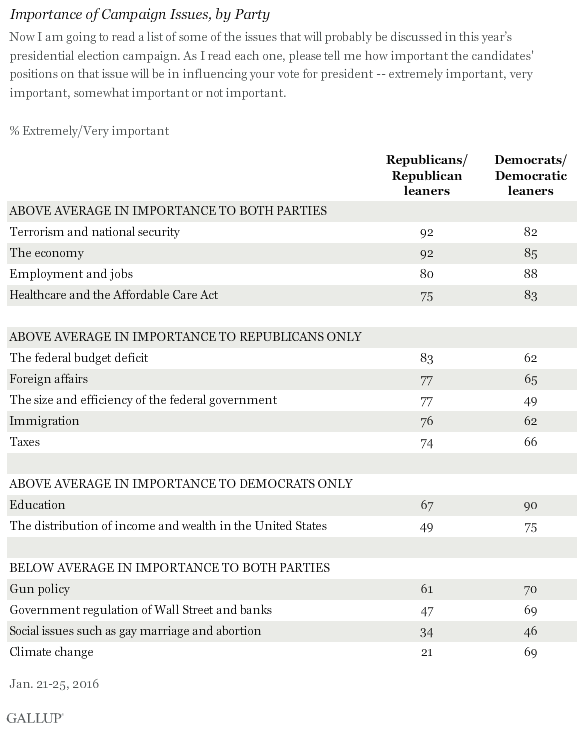
These data, from Gallup's Jan. 21-25 Election Benchmark survey, are based on Americans' responses to a question asking them to rate the importance of the candidates' positions on 15 issues. Overall, Americans rate the economy, terrorism, jobs, healthcare and education as most important. The detailed results are at the end of this article.
The accompanying table groups each issue based on the issue's importance among Republicans and Republican-leaning independents and among Democrats and Democratic-leaning independents. Republicans' average importance rating across the 15 issues is 67%, while Democrats' is 71%.
The economy, terrorism, jobs and healthcare clearly are the four issues that share higher-than-average importance among both partisan groups.
Issues Important to Only One Party
Five issues are well above average in importance for Republicans, but are not as important to Democrats. These are:
- The federal budget deficit
- Foreign affairs
- The size and efficiency of the federal government
- Immigration
- Taxes
Of these five, the size and efficiency of the federal government receives particularly low ratings from Democrats. It is the second lowest of any issue tested for that partisan group. Democrats' importance ratings for the other four are below the Democratic average.
One issue has slightly above-average importance for Democrats but is well below average for Republicans: the distribution of income and wealth in the U.S. One other issue, education, is way above average for Democrats (it is their highest-rated issue), while just at the average importance rating among Republicans.
Issues Below Average in Importance to Both Parties
Four issues have below-average importance ratings for both partisan groups, although three of these are barely below the average for Democrats. These are:
- Gun policy
- Government regulation of Wall Street and banks
- Social issues such as gay marriage and abortion
- Climate change
Climate change is the lowest rated of the 15 issues tested among Republicans, while coming in just below average for Democrats. Social issues clearly have low importance across partisan lines; they are the lowest rated among Democrats and second lowest among Republicans.
Across the 15 issues, six show the largest discrepancy in rated importance between Republicans and Democrats, making these highly partisan concerns in the 2016 election environment:
- Climate change. Democrats' importance rating is 48 percentage points higher than Republicans', making this the single most discrepant issue of the 15 tested.
- Size and efficiency of the federal government. Republicans rate it more important than Democrats by 28 points.
- The distribution of income and wealth in the U.S. (Democrats: more important, by 26 points)
- Education. (Democrats, +23 points)
- Government regulation of Wall Street and banks. (Democrats, +22)
- The federal budget deficit. (Republicans, +21)
Top-of-Mind Priorities
A separate, open-ended question asked Americans to name the single issue or challenge they are most interested in having the next president address when he or she takes office next January. Americans' most frequently given responses involve the economy, followed by mentions of immigration, defense/national security, healthcare and terrorism -- generally similar to the top-ranked issues in the list format.
The biggest differences between the two partisan groups on this question involve defense and national security, mentioned spontaneously by 19% of Republicans as the most important issue for the next president, but by only 5% of Democrats. Republicans are also more likely than Democrats to mention immigration and, to a lesser extent, the economy.
For their part, Democrats are more likely to mention education, as well as issues revolving around wages and Americans' ability to make a decent wage and, to a lesser extent, the environment.
The two partisan groups are about equally likely to mention healthcare and terrorism.
![Regardless of who wins the election, what single issue or challenge are you most interested in having the next president address when he or she takes office next January? [OPEN-ENDED]](http://content.gallup.com/origin/gallupinc/GallupSpaces/Production/Cms/POLL/xxj3jumafu2mzgfj9sowvq.png)
Bottom Line
Republicans and Democrats alike generally agree that the presidential candidates -- and the next president, whoever that might be -- should focus on the economy, on jobs, on terrorism and national security and on healthcare.
Beyond that agreement, the interests of the two partisan groups diverge, with Republicans giving more importance to certain specific issues and Democrats to others.
These differences across groups are meaningful at this point in the campaign, given that candidates are firmly focused on getting votes from their own partisans in the caucus and primary process that begins with Feb. 1 voting in Iowa. However, as the campaign pivots to the general election, the parties' nominees to some degree will need to pay more attention to issues of importance to those outside their party -- in the effort to gain votes of weakly affiliated partisans and of independents. And, of course, the research reviewed here deals only with the importance that Americans put on each concern as a campaign issue. This leaves the candidates to deal with the challenge of presenting proposals for solving the issue that resonate with their own party's voters in the primary process, but also with a broader constituency in the general election.
These data on priorities help in evaluating how well-connected the candidates are with various constituents in the current election process. The Democratic candidates, for example, have focused on inequality and what they perceive to be the inordinate power of Wall Street -- issues that are not among the most important for rank-and-file Democrats whose votes they need in the fight for their party's nomination, unless the candidates can tie them in to broader concerns about the economy and jobs.
Republican candidates who focus on gun rights and social issues such as abortion and gay marriage likewise find themselves addressing concerns that are not among the top issues for their party's constituents as a whole, although perhaps more so for smaller segments of the party such as evangelicals.
Overall, these data aid in the process of continuing to understand the attitudes and priorities of the American people as the election process unfolds, ultimately helping measure how well what the candidates are discussing and proposing fits with the views of the people they are vying to lead as chief executive.
The complete responses to both sets of questions are presented here:
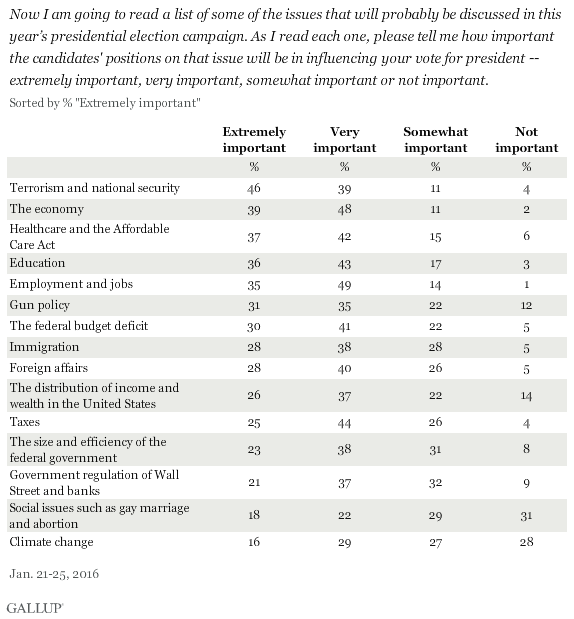
![Regardless of who wins the election, what single issue or challenge are you most interested in having the next president address when he or she takes office next January? [OPEN-ENDED] January 2016](http://content.gallup.com/origin/gallupinc/GallupSpaces/Production/Cms/POLL/ozyuh0uqzeka_u5i9z3o0w.png)
These data are available in Gallup Analytics.
Survey Methods
Results for this Gallup poll are based on telephone interviews conducted Jan. 21-25, 2016, with a random sample of 1,022 adults, aged 18 and older, living in all 50 U.S. states and the District of Columbia. For results based on the total sample of national adults, the margin of sampling error is ±4 percentage points at the 95% confidence level. For results based on the total sample of 479 Republicans and Republican-leaning independents, the margin of sampling error is ±6 percentage points at the 95% confidence level. For results based on the total sample of 460 Democrats and Democratic-leaning independents, the margin of sampling error is ±6 percentage points at the 95% confidence level. All reported margins of sampling error include computed design effects for weighting.
Each sample of national adults includes a minimum quota of 60% cellphone respondents and 40% landline respondents, with additional minimum quotas by time zone within region. Landline and cellular telephone numbers are selected using random-digit-dial methods.
Learn more about how Gallup Poll Social Series works.
